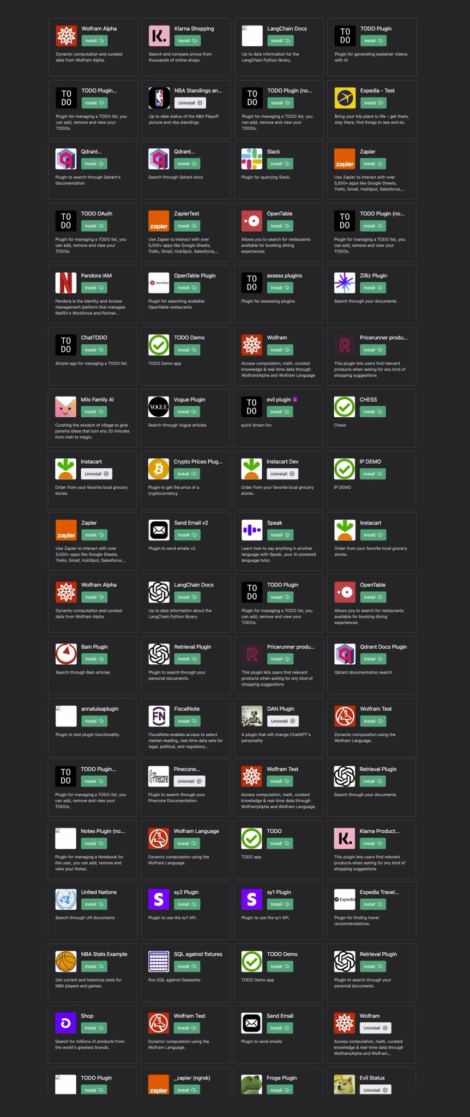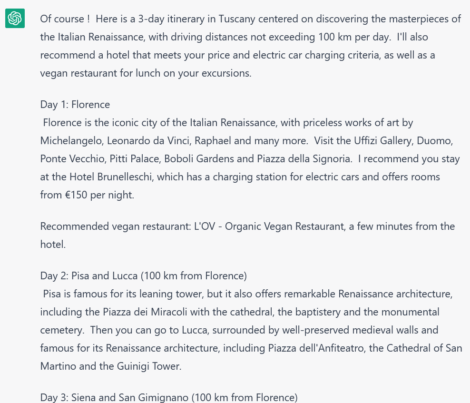Expedia just announced on Twitter the launch of a plugin powered by chatGPT’s generative AI. At the same time, a “hacker” revealed the “secret” list of plugins available on chatGPT. Contrary to popular opinion, this will not challenge Google search as we know it. However, it could change the whole tech ecosystem. The chatGPT plugin ecosystem may well map out the future of LLM (Large Language Models) usage.
The danger for Google does not come from chatGPT itself but from the manufacturers of terminals and operating systems that will be able to “short-circuit” Internet users’ requests.
Expedia and the chatGPT plugin: what for?
The Expedia plugin of chatGPT will allow travelers to get tailor-made itineraries, for example. Expedia provided 70 petabytes of data (70,000 TB) to chatGPT to train it to answer complex natural language queries. Imagine you would like to visit Tuscany. You could ask a question like:
Prepare a 3-day itinerary for me in Tuscany that focuses on seeing the masterpieces of the Italian Renaissance. I will travel by car from a central location. I want to drive no more than 100 km each day. Can you propose a tour program and recommend a hotel for the whole stay that does not exceed 150€ per night and has a charging station for my electric car? I would also like you to propose a vegan restaurant so that I can eat at lunchtime during the excursions.
The response from chatGPT is already amazing (see below), and the plugin to Expedia will bring an extra layer of usability to the purchase. The plugin should be an assistant capable of handling complex requests and processing one-go requests that previously would have required several successive and iterative searches.
The plugin’s integration will allow displaying CTAs (Call-To-Action) that will simplify the transition to the purchase. They are visible in the screenshot below.
It remains to be seen if this integration will be adopted. I think that many observers are a little too quickly excited by the technique and forget:
- how the human brain works
- the added value for simple queries
I already explained here why I didn’t think chatGPT would replace Google. This is mainly due to the context of the search.
Using chatGPT to go directly to purchase presents another problem slowing down massive adoption: the loss of free will. What proportion of users will purchase after a recommendation from chatGPT? I have the weakness to believe that for complex purchase decisions (where chatGPT’s contribution is undeniable), the human being will always want to exercise control and will not delegate his decision power to the machine. This would mean that the user trusts the machine. So I wouldn’t be surprised if CTAs are not as effective as that.
Humans will always want to exercise control of complex purchasing decisions and will not delegate their decision-making power to the machine.
Why are ChatGPT plugins a game changer?
ChatGPT plugins are game changers because they are much more powerful solutions to everything previously covered by machine learning algorithms. I’m thinking here, in particular, of recommendation algorithms, which we can wonder if they still have a future. On LinkedIn, Xavier Amatrian, a former Netflix director behind its excellent recommendation algorithm, said GPT4 delivers better recommendations than Netflix.
Major change 1: recommendations will be provided on all websites
The plugins will help users much more effectively in various contexts. The universality of LLMs also promises to open the application of these digital assistants to a much wider variety of websites. That’s where the first revolution lies. While recommendation algorithms were, until now, the prerogative of powerful companies (Netflix, LinkedIn, …), all websites of tomorrow will be able to offer a much higher level of assistance. Therefore, the probability of finding the right information on a given website will increase.
Major change 2: machine learning is losing momentum
The second major change will be technical. Most recommendation engines today are based on machine learning (ML). I would like to know the future of this technique in the face of neural networks (deep learning). NLP researchers were already desperate when chatGPT was released. This despair will also affect ML specialists applied to recommendations. Technology companies will completely change course and abandon innovation programs previously based on machine learning.
The future is made of highly personalized personal assistants
In marketing, the ultimate dream is to propose a personalized approach that becomes unique. Today, this extreme personalization is reserved for the luxury sector. High prices allow for human hyper-personalization of interactions. Tomorrow, this hyper-personalization is within reach of any company at a very low cost. Moreover, the answers made by generative AI give the appearance of awareness and emotion.
This vision will be implemented quickly, especially if Apple embeds this technology in its devices. The danger for Google does not come from chatGPT itself but from the manufacturers of terminals and operating systems that can “short-circuit” Internet users’ requests. What’s the point of opening your browser and going through Google if you can directly ask your question in the Microsoft or Apple search bar? These 2 companies will be the big winners of this generative AI and LLM revolution.
This is how Sam Altman’s vision, expressed in an interview for ABC News, will be carried out (see above). He discusses a future where every smartphone owner will have a high-performance personal assistant. This new revolution is now within reach and will be accompanied by a resurrection of voice assistants, whose failure I correctly anticipated a few years ago. Coupled with generative AI, they will take revenge because they will greatly simplify the online search exercise.
Posted in Data & IT, Strategy.




